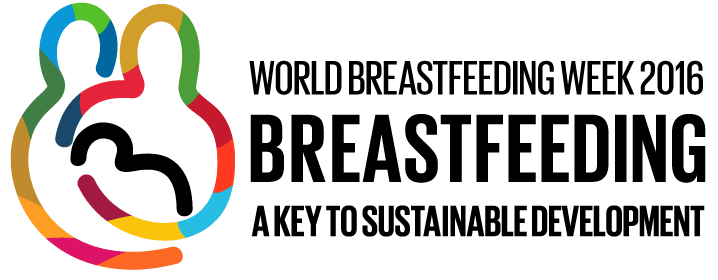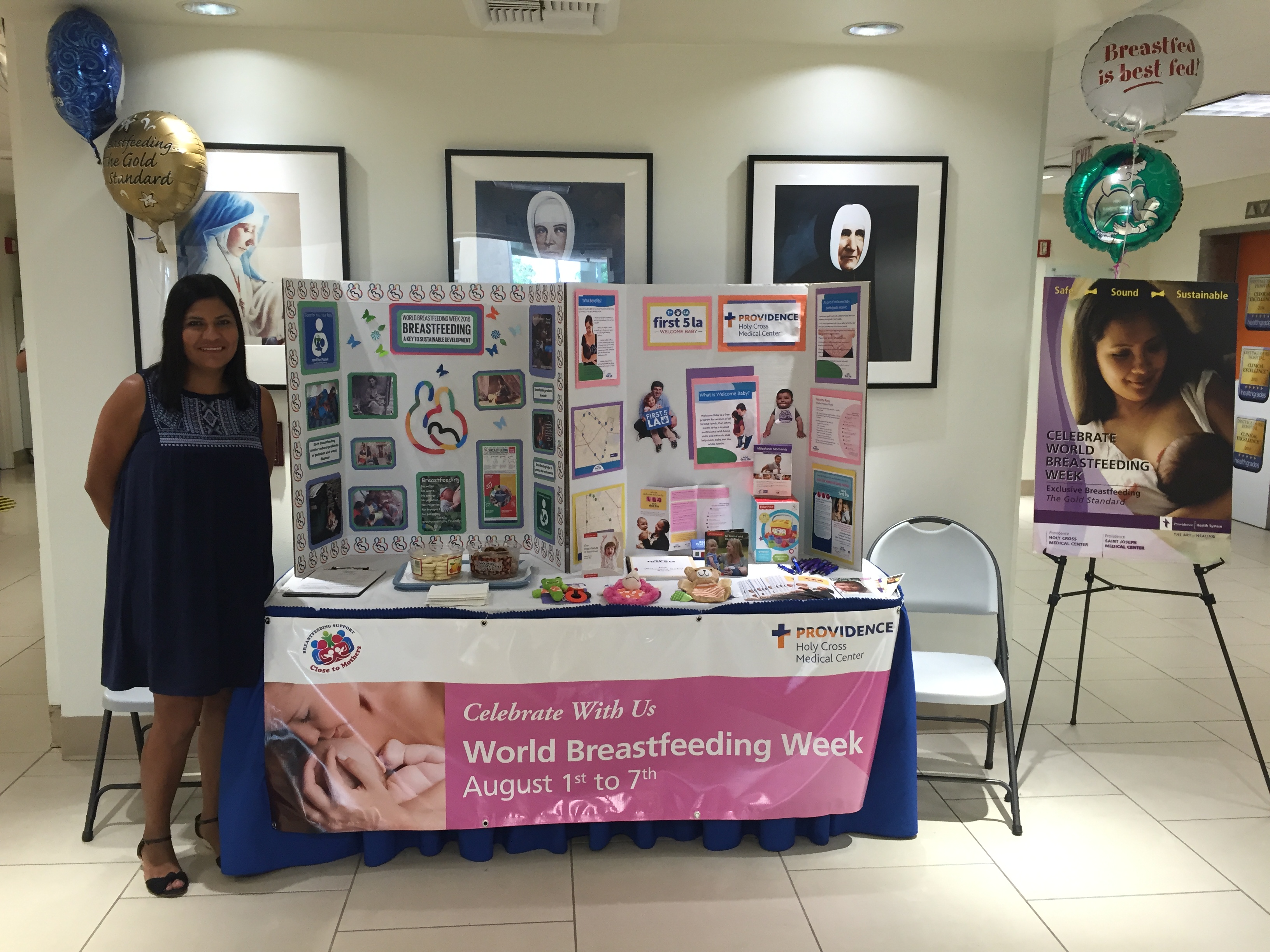Breastfeeding Awareness: Resources and Research
August is all about breastfeeding awareness. Each year, the U.S. Breastfeeding Committee declares it National Breastfeeding Month (#NBM16). The first week (August 1-7) is World Breastfeeding Week and August 25-31 is Black Breastfeeding Week. Get the latest from Twitter using #BreastfeedingWeek and show your support by submitting the WBW Event Pledge Form.
Every day throughout the year, our Family Strengthening Network’s home visiting programs help new moms breastfeed their babies. Learn more about the Family Strengthening Network and see a list of the 14 hospitals that participate in Welcome Baby, which offers free home visiting services to women who deliver there. (One of those hospitals — Providence Holy Cross Medical Center in Mission Hills — sent us this photo of the nice display table they set up to promote World Breastfeeding Week.)
This year, World Breastfeeding Week focuses on breastfeeding as “Key to Sustainable Development.” The UNICEF & WHO statement sums it up nicely:
There is a reason why virtually every country around the world observes World Breastfeeding Week every year: Breastfeeding is one of the most effective — and cost-effective — ways to save and improve the lives of children everywhere, yielding lifelong health benefits for infants and their mothers.
And increasingly, it is clear that breastfeeding is not only the cornerstone of a child’s healthy development; it is also the foundation of a country’s development. In fact, supporting breastfeeding is one of the smartest investments countries can make in the well-being of their citizens — and thus, in their own long-term strength. In low-, middle- and high-income countries alike, the benefits for individuals, families and societies include ending preventable child deaths, improving maternal and child health, boosting educational attainment, and increasing productivity.
These are some of the conclusions of the recent series on breastfeeding in The Lancet, which argues that improving breastfeeding practices makes the world healthier, smarter, and more equal.
See the complete UNICEF & WHO statement and the USDA proclamation.
The Latest Research … and a Research-Based Infographic
- Breast-Fed Babies May Have Longer Telomeres, Tied to Longevity (New York Times, 8/4/16. See the study, published in The American Journal of Clinical Nutrition, August 2016): Researchers have discovered that breastfeeding is associated with having longer telomeres — a sign of longevity and health.
- Can Breastfeeding Protect Against Childhood Obesity? (Discussion Paper by National Academy of Medicine, 8/2/16): Author Rafael Pérez-Escamilla of the Yale University School of Public Health concludes that a “causal relationship between breastfeeding and childhood obesity risk is plausible.”
- Breast Milk Feeding, Brain Development, and Neurocognitive Outcomes: A 7-Year Longitudinal Study in Infants Born at Less Than 30 Weeks’ Gestation (The Journal of Pediatrics, 7/26/16): A new study, which followed 180 pre-term infants from birth to age seven, found that babies who were fed more breast milk within the first 28 days of life had had larger volumes of certain regions of the brain at term equivalent and had better IQs, academic achievement, working memory, and motor function.
- The Lancet Breastfeeding Series (1/30/16): The series confirms the benefits of breastfeeding, including fewer infections and increased intelligence for babies, and protection against obesity, diabetes, and cancer for mothers.
- Infographic: Why Premature Infants Need Access to an Exclusive Human Milk Diet (National Coalition for Infant Health)
Tips and Guides to Help Moms Breastfeed
Home visitors and other public health professionals: Be sure to read The CDC Guide to Strategies to Support Breastfeeding Mothers and Babies, which outlines strategies to support breastfeeding mothers and provides links to practical resources. Here are some resources you can give to the moms you work with:
- Your Guide to Breastfeeding (Office on Women’s Health, DHHS)
- Breastfeeding Fact Sheet (also in Spanish) (Office on Women’s Health, DHHS)
- Guide to finding breastfeeding support (Office on Women’s Health, DHHS)
- La Leche League has a help-line and lots of practical information.
- Why breastfeed? See the DHHS Office on Women’s Health Benefits of Breastfeeding.
- When should you not breastfeed? The CDC says it’s rare that any disease or condition outweighs the benefits of breastfeeding. Learn more.
- How to properly handle and store human milk (CDC recommendations)
- Frequently asked questions (answers from the CDC)
Resources for Breastfeeding Support in the Workplace
Download LA Best Babies Network’s “Breastfeeding-Friendly Workplace Policies” booklet in English or Spanish. Also see these helpful breastfeeding-rights resources:
- Breastfeeding-Friendly Workplace Lactation Accommodations Policy (template for business/organization from BreastfeedLA)
- BreastfeedLA Resource Directory in L.A. County
- The Business Case for Breastfeeding: Steps for Creating a Breastfeeding Friendly Worksite
- CDC Healthier Worksite Initiative, Workplace Lactation Support Program Toolkit
- EEOC Enforcement Guidance: Unlawful Disparate Treatment of Workers with Caregiving Responsibilities
- California State Laws on Breastfeeding
- National Conference of State Legislatures Compilation of State Breastfeeding Laws
- U.S. Breastfeeding Committee, Workplace Support and Coalitions Directory
- International Lactation Consultants Association, Worksite Lactation Support Directory
- The Surgeon General’s Call to Action to Support Breastfeeding
Breastfeeding Support at Hospitals and Schools in California
How are hospitals doing with respect to helping new moms breastfeed? The California Department of Public Health recently released 2015 breastfeeding initiation rates for local hospitals, counties, and the state:
- Data Tables and More
- Cover Letter to Hospitals and an attachment
- Hospital of Occurrence
- Hospital of Occurrence by Race/Ethnicity
How about schools? The ACLU of Southern California, BreastfeedLA, and the California Women’s Law Center recently released ABC’s of Breastfeeding in Los Angeles County School Districts, a report on the state of lactation accommodation policies in Los Angeles County school districts.
Do you have any resources to suggest? Post a comment below!


